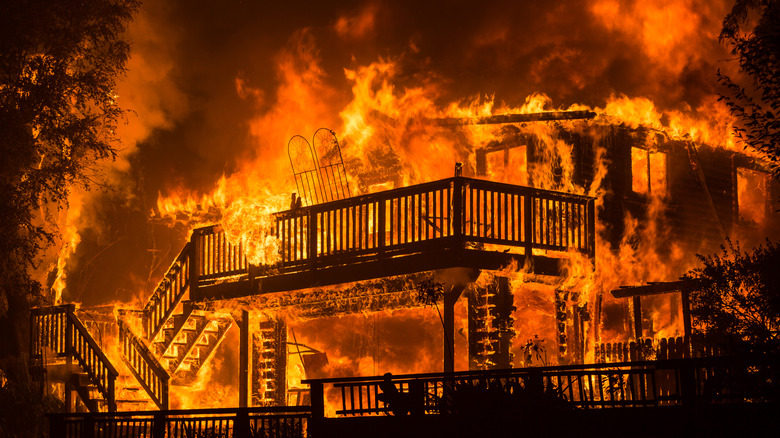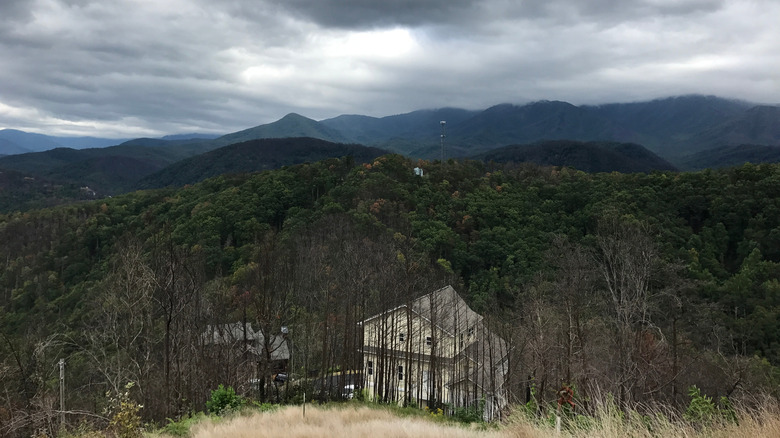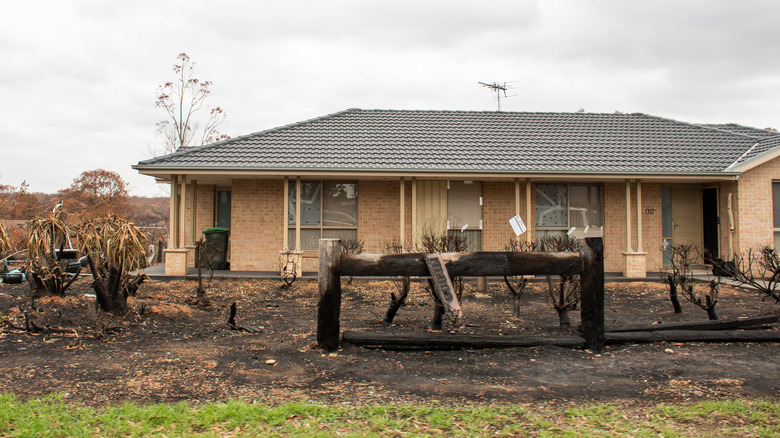The Best Way To Make Your Home More Resistant To Wildfires
As Smokey the Bear said, "Only you can prevent forest fires." You also can take steps to prevent your home from going up in flames at the hands of those same blazes. Wildfires are no longer a rarity, and 2022 is heading toward a record amount of incidents. As of July 26, there have been 38,402 fires consuming 5,578,815 acres to date, according to the National Interagency Fire Center. Not merely confined to the West as commonly believed, more wildfires actually occur in the East and Central states, although the western ones tend to be more damaging.
A multi-pronged approach is required to make your house wildfire-resistant. One's home is at the mercy of two types of wildfires: surface and crown fires. Per Firewise Landscaping, the former is confined to the ground and can surround the building and ignite it. Crown fires travel along the forest canopy, spewing flaming embers as they move. Establishing a defensible perimeter around the house and property is essential to protect it from the blazes. Precautions such as adding or replacing existing materials with fireproof ones, practicing appropriate landscaping, or engaging in effective fire-fighting behaviors are keys to potentially saving your house, while planning ahead if moving into a new home may spare it in the future. Wildfires are more common and destructive than ever, and no home is invulnerable. However, a thorough and well-thought-out strategy, complete with making the necessary changes, can increase the odds of your house emerging from an inferno unscathed.
Fortify your home
According to FEMA, your home's survival depends on its construction, its components, and the various other steps taken to safeguard it. Having a firewall surround is crucial. Drives and walkways should be made of non-flammable materials, while the lawn itself (allowed to grow 4 inches maximum) will act as a fire break. Anything combustible should be kept well away from this space. The exterior walls should also resist fire, Ready For Wildfire suggests using materials including stucco or treated wood. Decks need to be fireproof as well. Equip your home with multi-pane windows made of safety glass, and install shutters resistant to fire.
A roof is another inviting target and should have a non-flammable covering of tile, clay, or even metal. Metal gutters are advisable, and roofs and gutters should be kept debris-free. External vents should have screens as should chimneys. Outside structural gaps can be sealed with fire-retardant materials.
Weatherstripping your garage will prevent it from becoming a point of fire entry, and don't store anything flammable near it. Stock the garage with fire-fighting equipment such as extinguishers, buckets, shovels, and hoses. Forbes Advisor recommends not having abutting fences with your neighbor to avoid having a fire-feeding gap in the middle, moreover, a fence should also be fireproof and not too near the house.
Safety zone
Ideally, you should ensure a 30-foot safety zone around your home, which should be kept free of anything flammable. Lawn mowers, propane tanks, or gas cans are taboo there. Disaster Safety recommends that vehicles such as RVs, ATVs, and boats should be parked more than 5 feet away from the house. Woodpiles, dog houses, and flammable outdoor furniture should also be kept at a distance.
Paying attention to your plants and trees is prudent. Remove mulch, leaves, and pine needles from the zone. Trees should be pruned and not be placed too close together. Their canopies should be a sufficient distance from the house, and tree limbs should not reach lower than 10 feet from the ground. Southern Foresters assert that oil-free plants or ones that don't generate much debris are the safest for fire-resisting purposes. Having multiple external water taps is another safety tip.
Remember that anything surrounding a home has the potential to ignite. Before the worst comes to pass, make sure you have an evacuation plan for family and pets. Have your home fire insurance in order, and confirm that first responders won't have trouble reaching your home. Easy-to-see street signs and house numbers are critical, and if your property is gated, provide the fire department with a spare key.


